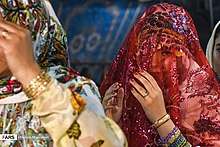Kurmanji Kurds
| Total population | |
|---|---|
| c. 20,222,890[1] | |
| Regions with significant populations | |
| 15,000,000[1] | |
| 2,800,000 (2004)[1] | |
| 350,000 (1988)[1] | |
| 938,000 (1993)[1] | |
| 45,000 (2002)[1] | |
| 20,000 (1989)[1] | |
| 40,000 (1991)[1] | |
| 215,000[1] | |
| 20,000 (1962)[1] | |
|
38,325 (2011 census)[2] 46,000[3]–150,000[4] | |
| Languages | |
|
Kurdish (Northern Kurdish and Central Kurdish | |
| Religion | |
| Islam, Zoroastrianism, (formerly) Yezidism | |
| Related ethnic groups | |
| other Kurdish kinfolks, Iranian peoples | |
The Kurmanji Kurds (Kurdish: Kurdên Kurmancî, Кöрдэн Кöрманщи, کوردێن کورمانجی) or simply Kurmanj (Kurdish: Kurmanc, Кöрманщ, کورمانج) are a subgroup of Kurdish people, they live primarily in northern parts of Kurdistan (from Sarhad to Hakkari and to Upper Mesopotamia) and in Anatolia (Turkey), north of Mukrian and in Khorasan (Iran), in Bahdinan region of Kurdistan (Iraq) also in northern parts over the Syrian Arab Republic.
History
The Kurmanjis were from Kortsayk and Mardpetakan, they inhabited the regions from lake Urmia to the Since they converted to Islam, many Kurmanji dynasties expand toward north, northwest and to the west, the Marwanids ruled from Sophene (Diarbakr) to lake Van and the Shaddadids ruled the regions between Aras and Kura rivers also over Armenia and Shirvan.
Etymology
According to M. Izady, The name Kurmanc could mean Mannean Kurds, Kurd and Manna, the Manneans lived in the region west of lake Urmia.[5]
The regional pronunciations of "Kurmanj" are; Kurmanc
People

More than 20 million people speaks the northern Dialect of Kurdish, and live in the countries of Turkey, Iran, Syria, Iraq, Armenia, Azerbaijan, Georgia, Russia and other states of central Asia, but the majority is in Kurdistan, Anatolia and Khorasan
Language
Kurmanjis speaking the Kurmanji (Kurmancî) dialect of the Kurdish languages, the dialect is in the West known under the name Northern Kurdish, in Southern parts of Kurdistan it is known as Badînî (a dialect continuum of N.Kurdish) and the Sharima people in Dersim region call the dialect as Kirdaskî.
Religion
All religious Kurmanjis believe in one God, named the Khuade (Xwedê), and are mostly Muslim (Alevi, Sunni) most of the Sunni Kurmanjis belonging to the Shafi school.
References
- 1 2 3 4 5 6 7 8 9 10 "Northern, Kurdish". Ethnologue. Retrieved 5 July 2016.
- ↑ "Table 4.1.1 Population by individual ethnic groups" (PDF). Government of Kazakhstan. stat.kz. Archived from the original (PDF) on February 28, 2013. Retrieved 9 July 2012.
- ↑ "Kazakhstan: Ethnic Minorities Guaranteed Seats In Parliament". Radio Free Europe Radio Liberty. 27 June 2007. Retrieved 2 December 2012.
- ↑ "Kazakhstan: A paradise for ethnic minorities". Kurdish Media. Archived from the original on 25 March 2012. Retrieved 2 December 2012.
- ↑ https://books.google.at/books?id=EAbICQAAQBAJ&pg=PA167&dq=kurt+and+manna+kurmanj&hl=de&sa=X&ved=0ahUKEwjjz9nQ1t_NAhWB1RQKHUYkB10Q6AEIHDAA